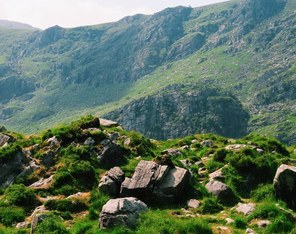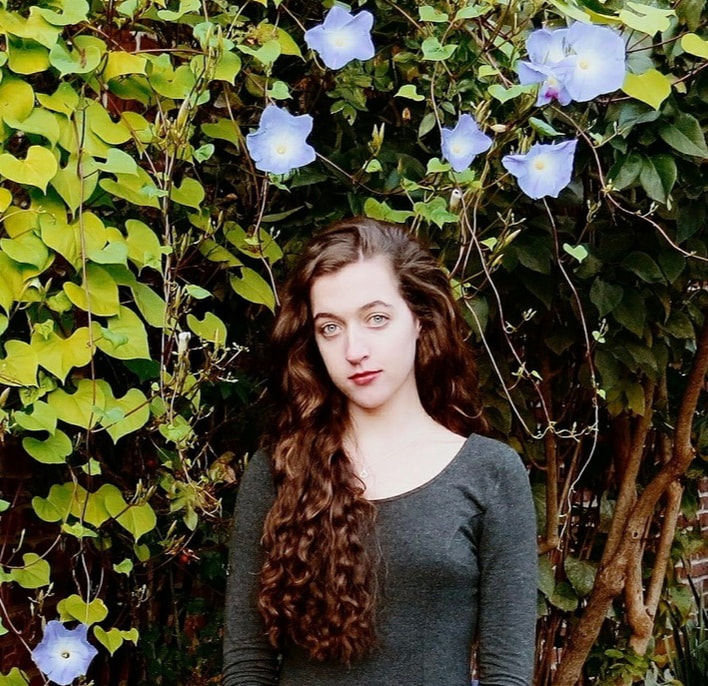 Is mise Éirinn. Can you hear the forgotten language that hides under my tongue? I am Ireland. Few people understand the second voice, the foreign words that link between the spirit and soul. Do you see the traces of gold and emerald that run under my skin? There is certain kind of paleness that exposes these veins to the light. And I suppose my grandmother can take the blame, for there are few traits she did not pass down to me. My parents named their youngest daughter after the emerald land across the sea. Despite our large size, and the miles of ocean that separate our dwelling places, our extended clan has always been close. While letters and photographs keep our thoughts scattered between two countries, we are connected through the heritage that runs through the streams of our blood. Memories of my childhood remain vivid, each moment gleaming like a sun-drenched field of green. I want to bottle it up, and keep it in a silver locket around my neck, and never forget all of the traditions and turning points that formed so much of my character. Even before my life began, so much was decided for me—as it was for the rest of my clan. The moments and memories spread out in a timeline before me, always beginning with the difficult decision of a seventeen-year-old girl on the coast of Ireland. What sort of courage does it take for one to leave their childhood behind, across 3,059 miles of ocean? I’ll never know for sure, even while my grandmother attempts to share it with me. There was a point when she thought the cargo ship might not reach the shores of New York. Even so, if she had not been brave enough to take the risk, so much would be different. And many years after her voyage, I rest on the carpeted floor of her cottage. I listen to the murmur of her voice as she counts the stitches of her knitting in the language of that land. During the routine car rides to the school of Irish dance, she plays the cassette tapes of her favorite jigs and reels. Whilst friends marvel at the lilt of her brogue, I tilt my head in confusion, for it does not sound so strange to me. Perhaps the woman planned it, the way her passion for the culture swept over her descendants. The mere thought of her famous soda bread brings a warm scent along with it. Those cable knit sweaters and steaming cups of tea are more than defining features. Those tales of folklore are not so fictional after all, as the faeries and knights give honorable ambition to the people of Ireland. Those ancient prayers and glorious hymns bind together, reminding me to keep my eyes focused beyond the stars. At the age of thirteen, that Gaelic language begins to find a home in me. It is a familiar tongue that hides between the cracks in the sidewalk. It becomes a sort of rare and secret code, between the true members of the Irish-American discourse. Is it possible to grow between two separate discourses, whilst blending them into one? My culture learns to flourish in the space where flowers grow between the concrete. People will continue to pester my parents--mo thuismitheoirí—with words that burn in ignorance. Some will never understand the value of such connection to the human soul. Those friends cannot hear the music that flows as Gaeilge, or see the translations that bring renewed meaning. “You must teach your children a useful language—like Spanish or French!” What could I do with such knowledge? Travel the world, perhaps. And those strange words would never bring me back home—back to the land of my people. I follow my passions, despite it all. Tá Gaeilge agam. Fleeting traces and lasting themes seep through in the form of cursive ink—words of wit, lines of prose. It appears in the names of characters, pronounced unlike anything the average man has read before. It is found in the allusions to age-old tales, in the collection of novels that line the walls of my room. I board a red-nosed plane in the beginning of summer, to reunite with cousins and learn some more. It carries me across the sea, to the place that makes me hesitate before each flight back. A piece of my soul hides in these craggy fields, like a faerie searching for lost magic. It hums the song of the honeybees that glide through the glade, spreading pollen across the everlasting meadows. A forgotten tale is nestled in the crevice between every stone. It speaks of a vibrant and immortal heritage, the blood of clans spread across seas. As a young girl, I learned the meaning of my name, and few children beheld their signature with such pride. "Éirinn go Brách," my mother spoke to me, "you are named after the emerald land across the sea; the birthplace of your grandmother, the true home of your family, under the sun that gave your fair eyes and freckled skin." All this is true, and it becomes a part of me. The extra space in my library disappears with time. Devoted to the land of saints and scholars, it fills with the works of Lewis, Heaney, and Yeats. I stand here on the seaside now, smiling against the gentle rain. A wild love brought me to this place, and it will bring me back soon enough. A castle stands behind me, as old and ancient as time can tell. I've lost something within it, whilst searching for something else. An old language rests on the tip of my tongue. It survives in pockets across the raging sea, and thrives nevertheless. ~ Erin E. Forbes (an essay dedicated to my culture)
1 Comment
I am from a little village—a place not too close or too far from Manhattan. It’s a small town, a hipster sort of place, which the city-dwellers migrate toward on the weekends. Artisan cafés, antique barns, and boutiques hide behind the windows of colorful storefronts. There is an overabundance of coffee shops, each one suitable for a different person or mood. The weekenders frustrate a lot of the locals, while others find pride and entertainment in the art of recognizing these foreign characters in public. My house can be found on a rural, winding road, which does not boast a single row of center lines. My father always complains about this, since the tourists never remain on the proper side of the street. Horses and cows are scattered between the pastures, while red foxes hide in the bushes beside the flood drains. It is a perfect place to remain—not too far from civilization, but far enough for the peace that comes with distance. An old tree stands on the edge of the meadow, which holds my house in the palm of its hand. Its branches reach toward the field of clover, like a person who wishes to dance in the sunlight of the open space. I’m not sure what type of tree it is—the bark is quite rough, and salamanders like to hide between the roots. Even before the sage-colored house was built on the top of the hill, the tree reached out with arms of welcome. I wander down there at least once a week now, on foot or the back of my chestnut mare. I can never manage to pull myself up into the branches, without hanging like an animal with my arms wrapped around the trunk. It was crowned “the sloth tree” for this very reason, much to the wit and amusement of my brother. In the midst of rural countryside, it has become a sort of gathering place, where friends meet under the light of the afternoon. Even when no one stands under the branches, I swear the laughter remains, with the faint scent of daisies and whisper of autumn. (a bit of work from my creative writing course)
~ Erin E. Forbes |
AuthorErin Forbes is the young author of the Fire & Ice book series. When she was sixteen years old, she published the first installment in the Follow me on social media!
Archives
December 2018
|

